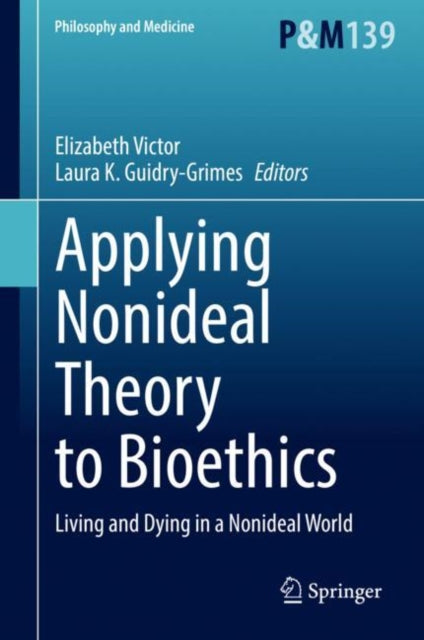Shulph Ink
Applying Nonideal Theory to Bioethics: Living and Dying in a Nonideal World
Applying Nonideal Theory to Bioethics: Living and Dying in a Nonideal World
YOU SAVE £18.37
- Condition: Brand new
- UK Delivery times: Usually arrives within 2 - 3 working days
- UK Shipping: Fee starts at £2.39. Subject to product weight & dimension
Bulk ordering. Want 15 or more copies? Get a personalised quote and bigger discounts. Learn more about bulk orders.
Couldn't load pickup availability
- More about Applying Nonideal Theory to Bioethics: Living and Dying in a Nonideal World
Nonideal theory in bioethics is an analytic approach that recognizes the world's imperfections and considers the sociopolitical realities of healthcare and moral actors' embeddedness. This book offers new essays exploring concepts and applications of nonideal theory, such as how to navigate systemic injustices, moral theorizing in difficult situations, and the perspectives of historically marginalized persons.
Format: Hardback
Length: 415 pages
Publication date: 04 August 2021
Publisher: Springer Nature Switzerland AG
This book presents a collection of fresh essays that delve into the concepts and applications of nonideal theory in the field of bioethics. Nonideal theory is an analytical framework for moral and political philosophy, particularly in the context of justice, which posits that we should not assume perfect compliance with principles, favorable circumstances for just institutions and right action, or the impartiality of reasoners. Instead, nonideal theory takes into account the inherent imperfections of the world and recognizes that reality is complex and multifaceted.
Bioethicists have increasingly recognized the value of nonideal theory as a guide in the complex and often messy realities they face daily. While many bioethicists implicitly incorporate nonideal theory into their work, there is a need for more explicit engagement with this theoretical perspective. A nonideal approach to bioethics would begin by examining the sociopolitical realities of healthcare and the embeddedness of moral actors within those realities. How are bioethicists to navigate systemic injustices when conducting research, providing guidance for patient care, and contributing to medical and public health policies? When faced with no clear-cut good options and when moral agents are deeply influenced by their sociopolitical viewpoints, how should moral theorizing proceed? What insights can be gained by examining bioethical issues and principles from the perspective of historically marginalized persons?
These are just a few of the questions that drive nonideal theory within bioethics. This book serves as a comprehensive introduction to nonideal theory, exploring its foundational tenets, its potential contributions to bioethics, and why it may be preferred over ideal theory in addressing moral dilemmas in clinical practice and beyond.
In Part I, the book provides an overview of nonideal theory, its origins. It discusses the key principles and assumptions that underpin this theoretical framework, including the recognition of the limitations of ideal theory, the importance of taking into account the real-world context, and the acknowledgment of the role of power and privilege in shaping moral decisions.
Part II of the book delves into the applications of nonideal theory in various areas of bioethics. Authors explore how nonideal theory can be used to analyze ethical dilemmas in research, clinical practice, public health, and policy-making. They discuss how nonideal theory can help us understand the complexities of moral decision-making, such as the influence of social norms, power dynamics, and cultural biases.
Furthermore, the book highlights the importance of recognizing the limitations of nonideal theory and the need for ethical reflection and reflexivity. It emphasizes the importance of acknowledging the role of moral agents in shaping the ethical landscape and the need for ongoing dialogue and collaboration to address complex ethical challenges.
In conclusion, this book offers a valuable contribution to the field of bioethics by providing a comprehensive introduction to nonideal theory. It highlights the importance of recognizing the inherent imperfections of the world and the role of moral actors in shaping ethical decisions. Through its applications in various areas of bioethics, the book provides insights into the complexities of moral decision-making and offers practical strategies for navigating ethical dilemmas in clinical practice and beyond.
Weight: 805g
Dimension: 235 x 155 (mm)
ISBN-13: 9783030725020
Edition number: 1st ed. 2021
This item can be found in:
UK and International shipping information
UK and International shipping information
UK Delivery and returns information:
- Delivery within 2 - 3 days when ordering in the UK.
- Shipping fee for UK customers from £2.39. Fully tracked shipping service available.
- Returns policy: Return within 30 days of receipt for full refund.
International deliveries:
Shulph Ink now ships to Australia, Belgium, Canada, France, Germany, Ireland, Italy, India, Luxembourg Saudi Arabia, Singapore, Spain, Netherlands, New Zealand, United Arab Emirates, United States of America.
- Delivery times: within 5 - 10 days for international orders.
- Shipping fee: charges vary for overseas orders. Only tracked services are available for most international orders. Some countries have untracked shipping options.
- Customs charges: If ordering to addresses outside the United Kingdom, you may or may not incur additional customs and duties fees during local delivery.


